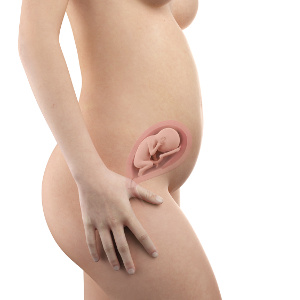Pregnant women with elevated blood pressure may be low in zinc
 Zinc is involved in numerous physiological functions, some of which are important for pregnancy and fetal development. However, zinc deficiencies are common, especially in developing countries. Vegans are also at increased risk because it is difficult for the body to absorb zinc from a plant-based diet. Zinc deficiency in connection with pregnancy appears to increase the expecting mother’s risk of developing hypertension, and the elevated blood pressure may result in low birth weight and a low Apgar score, which is a health assessment of the baby in the minutes right after delivery. This was shown in a study that is published in Frontiers in Nutrition.
Zinc is involved in numerous physiological functions, some of which are important for pregnancy and fetal development. However, zinc deficiencies are common, especially in developing countries. Vegans are also at increased risk because it is difficult for the body to absorb zinc from a plant-based diet. Zinc deficiency in connection with pregnancy appears to increase the expecting mother’s risk of developing hypertension, and the elevated blood pressure may result in low birth weight and a low Apgar score, which is a health assessment of the baby in the minutes right after delivery. This was shown in a study that is published in Frontiers in Nutrition.
The new study was carried out on pregnant women who attended gynecology and obstetrics departments in the Gaza strip in Palestine. The women were all in their third trimester and had a mean age 30.7 years. Their average daily zinc intake was calculated with help from a so-called food frequency questionnaire (FFQ) and compared with blood pressure readings and other tests during pregnancy and after childbirth.
It is quite normal for the blood pressure to go up a little during pregnancy. However, it should not exceed 140/90 mmHG as this may increase the risk of cardiovascular disease, stunted fetal growth, premature delivery and, in rare cases, placental expulsion.
The study linked a low zinc intake during pregnancy to an increased risk of hypertension. Also, the increased blood pressure increased the risk of low birth weight and a low Apgar score. Therefore, babies delivered by women with elevated blood pressure had an average birth weight of 2,904 grams, whereas the average birth weight of babies delivered by women with normal blood pressure was 3,128 grams. With regard to the Apgar score that assesses the baby’s health right after birth, babies delivered by women with elevated blood pressure was 8.03, while it was 8.30 in babies delivered by women with normal blood pressure. A higher score is better.
The researchers also observed by comparing the two groups of women that there was a difference in relation to caesarean delivery, preeclampsia, and oedemas. The scientists say that lack of zinc may be the most significant risk factor for hypertension in pregnancy.
Zinc’s functions during pregnancy and the serios risk of deficiencies
Zinc is an essential trace element that is involved in a number of physiological processes. It plays a key role in growth, fertility, and immune defense. Moreover, zinc is a powerful antioxidant that protects cells and tissues against oxidative stress. During pregnancy, it is particularly important to get plenty of zinc. A zinc deficiency may affect the mother’s health and the development of her unborn baby. Zinc deficiencies are not only a problem in relation to pregnancy-related hypertension but can also increase the risk of stunted fetal growth and impaired development of the immune defense, cognitive functions, and glucose tolerance. There is even an increased risk of premature delivery, low birth weight, and prolonged labor.
Zinc sources, problems with deficiency, and supplementation
Zinc is primarily found in shellfish, meat, eggs, dairy products, nuts, seeds, wholegrains, kernels, legumes, and raisins. However, phytin from plant foods blocks the body’s uptake of zinc so we absorb more zinc from animal food sources.
Previous studies show that zinc deficiency is a global health problem, especially in developing countries, including Palestine, where the diet is typically plant-based and not all that varied. According to WHO, between four and 73 percent of populations in the world are affected by zinc deficiency problems, depending on geography. Zinc deficiency is also the cause of one percent of global deaths and 4.4 percent of deaths among children in the ages six months to five years.
Our diet is the main source of zinc. In the United States and Australia, health authorities recommend 2-4 mg of additional zinc to pregnant women.
It may be a good idea to take a high-quality pregnancy supplement that contains zinc and other minerals, vitamins, and fish oil because they are highly important for the outcome of the pregnancy and for the development of the child.
Referencer:
Abdel Hamid El Bilbeisi et al. Assessment of serum, dietary zinc levels, and other risk factores during the third trimester among pregnant women with and without pregnancy-induced hypertension: a Case control study. Frontiers in Nutrition. 2023
TIP! See also the related articles
Search for more information...
- Created on .








